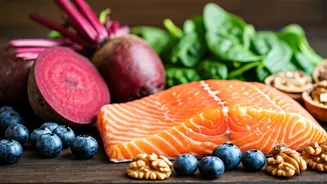Understanding Heart Blockages
Heart blockages, often caused by the buildup of plaque in arteries, impede blood flow and increase the risk of serious cardiac events. These blockages can
lead to conditions like angina (chest pain), heart attacks, and strokes. The plaque, composed of cholesterol, fat, and other substances, narrows the arteries, making it harder for blood to pass through. Factors such as a poor diet, lack of exercise, smoking, and genetics can contribute to the development of these blockages. Early detection and intervention, including lifestyle modifications and medical treatments, are vital for managing heart health and preventing further complications. Recognizing the signs and symptoms of heart blockages is crucial for prompt medical attention, allowing for interventions like angioplasty or bypass surgery, which can restore blood flow and reduce the risk of adverse events.
Power of Healthy Eating
Adopting a heart-healthy diet is a cornerstone of cardiovascular wellness. This involves choosing foods that actively support the health of your heart and blood vessels. A diet rich in fruits, vegetables, whole grains, and lean proteins is ideal. These foods provide essential vitamins, minerals, and antioxidants, all contributing to the reduction of inflammation and the prevention of plaque buildup in the arteries. Limiting saturated and trans fats, excessive sodium, and added sugars is also essential. Replacing unhealthy fats with healthier options like olive oil and incorporating foods high in soluble fiber can further improve heart health. Regular mindful eating, including portion control and meal planning, helps to maintain a healthy weight and reduces the strain on your heart. It's also important to stay well-hydrated, and choose beverages like water or herbal teas over sugary drinks.
Food Group: Fatty Fish
Fatty fish, such as salmon, mackerel, and sardines, are packed with omega-3 fatty acids, which are powerhouses for heart health. These essential fats help to reduce triglycerides, lower blood pressure, and decrease the risk of blood clots. The American Heart Association recommends eating at least two servings of fatty fish per week. Omega-3s work to reduce inflammation throughout the body, including the arteries, which reduces the chance of plaque accumulation. They also help improve the function of the endothelium, the lining of the blood vessels, enhancing blood flow. Choosing wild-caught fish, whenever possible, ensures that you receive the highest concentration of beneficial nutrients, while avoiding unnecessary additives. Including fatty fish in your diet is a simple yet powerful way to actively support the health and vitality of your cardiovascular system.
Food Group: Nuts & Seeds
Nuts and seeds, including almonds, walnuts, flaxseeds, and chia seeds, offer significant cardiovascular benefits. These small powerhouses are rich in healthy fats, fiber, and various vitamins and minerals, helping to lower LDL (bad) cholesterol levels. They also provide antioxidants, protecting the arteries from damage. Regular consumption of nuts and seeds has been linked to a reduced risk of heart disease. The fiber content helps to bind with cholesterol in the digestive tract, aiding in its elimination, which in turn benefits arterial health. When selecting nuts and seeds, opt for unsalted varieties to control sodium intake. Enjoy them as snacks, add them to your meals, or incorporate them into your smoothies. A handful a day can make a significant difference in your heart's well-being.
Food Group: Olive Oil
Olive oil, particularly extra virgin olive oil, is a cornerstone of the Mediterranean diet, recognized for its heart-healthy benefits. Rich in monounsaturated fats and antioxidants, it has the ability to reduce LDL cholesterol and improve overall blood vessel function. The antioxidants in olive oil help combat inflammation and prevent the formation of plaque in the arteries. Incorporating olive oil into your diet is simple. Use it for cooking, drizzling over salads, or as a finishing touch for cooked vegetables. When buying olive oil, look for extra virgin varieties, which are less processed and retain more of their natural nutrients. Substituting olive oil for less healthy fats can bring considerable improvements to your heart health. Regular consumption has been associated with a lower risk of heart disease and strokes, making it a valuable addition to any diet.
Food Group: Berries
Berries, such as blueberries, strawberries, raspberries, and cranberries, are rich in antioxidants, particularly anthocyanins, that contribute to heart health. These antioxidants help reduce inflammation and oxidative stress, protecting blood vessels from damage. Regular berry consumption has been linked to improved blood vessel function and a lower risk of heart disease. Their high fiber content also contributes to improved cholesterol levels. Berries are versatile and can be enjoyed fresh, frozen, or added to smoothies, oatmeal, and yogurt. The antioxidants in berries work to neutralize free radicals, safeguarding blood vessel walls. Consuming berries regularly can support a healthy cardiovascular system and lower the risk of chronic diseases. Including a variety of berries in your diet ensures you get a wide range of essential nutrients that are vital for overall heart health.



















